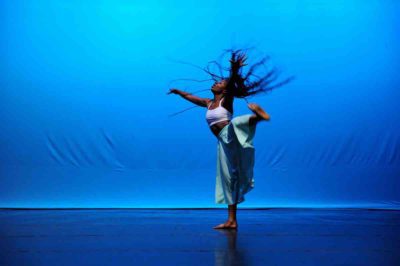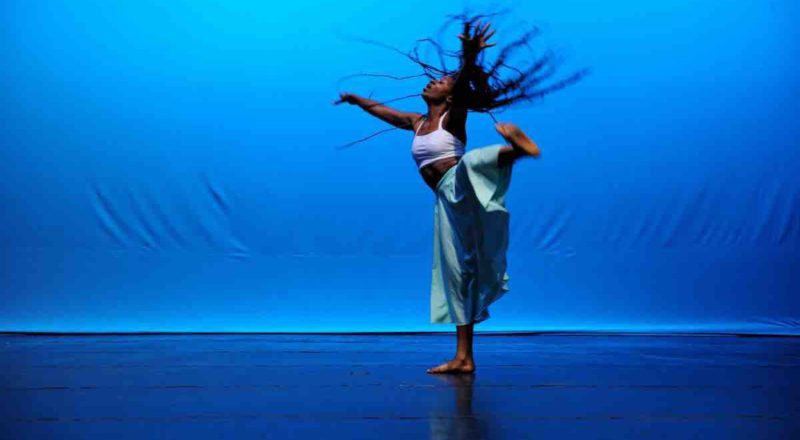INTERVIEW: Chris Walker honors legendary figure of Jamaican dance

When the National Dance Theatre Company of Jamaica presents three New York premieres at Brooklyn Center for the Performing Arts this weekend, there will be a lost of history and emotion on the stage. In particular, Chris Walker’s 12-minute tribute to the company’s founding artistic director, Rex Nettleford, will bring together a choreographic journey to the past and an artistic look at the future.
NDTC will present its performances Saturday, March 18 and Sunday, March 19 in the Walt Whitman Theatre at the Brooklyn Center for the Performing Arts at Brooklyn College. In addition to Walker’s piece, audiences will be able to see Folktales by Clive Thompson, Labess by David Brown, You/We with folk songs arranged by Ewan Simpson, Into the Blue by Renee McDonald in a New York premiere, Hommage a’Dambala by Kevin Moore in a New York premiere and Gerrehbenta by the late Nettleford. Walker’s piece is known as Mountain Climbing, and it will serve as a New York premiere.
“[Mountain Climbing is] a work I created in tribute to Professor Nettleford shortly after his passing and was presented the first time at the inaugural Rex Nettleford Arts Conference, and I guess the question I was asking myself, both in a process of healing and mourning, was what I felt like his major contribution was,” Walker said recently in phone interview. “I kept going back to this story that he told of coming home at the end of the day and seeing women going home with loads on their heads and their skirts swaying from side to side as they returned home up the sides of the mountains. … I was always fascinated by that story because it was related to a very distinct vocabulary in his work Gerrehbenta, which the focus was how the skirts moved, and I was just always fascinated by that and the story. So it brought me back to that moment, and so I started to think about those women in relation to his choreography.”
To prepare for Mountain Climbing, Walker researched Nettleford’s artistic creations over the last four-and-a-half decades. With Gerrehbenta in mind, he identified several female dancers who helped the legendary artistic director develop NDTC’s “modern vocabulary,” which pulled heavily from traditional and folk traditions. Those past influences were mixed with contemporary principles to create a new dance language, and that’s what Walker honors in the dance piece.
“There are different movements that were related to how different women during that period performed it, and so as I was shaping the choreography, I drew from that period and specific reference to those dancers, those female dancers on whom that vocabulary was shaped,” the choreographer said.
Mountain Climbing is performed in three parts. The first section deals with the discovery of this movement vocabulary, while the second part explores how that vocabulary is now considered modern and contemporary in Jamaica. “It’s just a part of the cannon; everybody uses it and not necessarily in reference to Rex Nettleford, who actually shaped it for us on stage, but we all use that vocabulary in very similar ways,” Walker said.
The final section of the 12-minute piece uses a form of music expression from Trinidad, and it features a series of chants and vocal tones. This music expression also exists in Jamaica, and these chants and vocal tones emerged at a time period when playing the drum was banned. So the piece speaks very much to Jamaica’s history.
“The last section is really a masking where the dancer strips herself of the trappings of tradition and contemporary culture but also is adorned with the trappings of ancestral pedigree,” he said. “It’s this conversation of how tradition and popular expression and future projection [are] always a part of the immediate conversation with self, and so the last section is, in my mind, what I would think of as the most contemporary in its expression where we see the body go through a physical transformation of masking, unmasking, stripping and advancing — but in that process recognizing the need for that connection with what you’ve been through. The advancement, the progression is connected to that which created it in the first place, so that’s what Mountain Climbing is in tribute to Rex Nettleford and structurally as pulled from his work. And then [it] makes a final contemporary particular statement about us and where we can go.”
Walker called his choreographic piece a challenging work for the performers. Most interpretations run 12 minutes, but there is freedom with the music that can allow the dancer to take even longer with the piece.
The choreographer said Mountain Climbing features difficult vocabulary that is specific and codified. At a deeper level, Walker’s piece explores Nettleford’s movement and “its relationship to music, its relationship to weight, the constant shifting of energy, the multiple dimensions that the movement attempts to put the body in as you articulate, isolation. So it calls upon a lot of technical clarity and demands a lot of technical clarity in its articulation, but it also demands a lot of cultural understanding. And from what the dancers have expressed to me is that it forces a sort of emotional response, which makes it even more difficult.”
He added: “They go through this sort of deep, emotional experience as a dancer, as a person where they feel enlightened and empowered and powerful at the end. … Every dancer who has done it has expressed to me that there’s a little raging feeling of power and ownership of self that they feel at the end, and that is something I’m most proud of.”
Walker has received positive feedback on Mountain Climbing, in particular for his choreographic journey to showcase the female perspective on movement and the human body. “I grew up in Jamaica as a man, and, yes, I’ll admit I’m a mama’s boy,” he said. “My sisters have a lot of power and importance in my life. … I see the women in my life as these powerful mountains themselves.”
Each time one of Walker’s dances are revived, he has a host of choreographic options. Sometimes he travels back to Jamaica and works with the dancers on the piece. Other times he offers his comments and direction virtually. Occasionally he will employ the help of a rehearsal director.
“Whenever I’m home, then I rehearse with the company, particularly in Professor Nettleford’s works and ensuring the vocabulary, the shaping, the use of space, how relationships are built in space, how they are discovered in movement, that part of the work is routine and maintained in strong ways,” he said. “I also participate in that process when we are on tour, so I work very closely with the artistic director [Barry Moncrieffe] and the associate artistic director in translating those works for stages in North America. So I am very involved and very close with the company, not just as a choreographer but as an adviser and an active member.”
Walker found the creation of Mountain Climbing artistically fulfilling. He welcomed this trip into the mind of Nettleford to understand how his mentor captured unique articulations. In a small way, with Mountain Climbing, Walker is able to thank Nettleford for changing the choreographer’s life. He doesn’t hold back with his praise of the founding artistic director. Nettleford gave Walker strong direction in life and helped the choreographer find purpose and better understand dance.
“Movement can have a deeper impact,” he said. “It was through dance and through the body that our ancestors were able to save, to retain, to hide systems, and what is now called West African technology was hidden in the body and then passed on through movement and through music and through rhythm. And that is so much mirrored in cultural activity in our lives, and so even as I come to these understandings through my own scholarship, all of it brings me right back to Rex Nettleford.”
He added: “Of everything that I’ve created, it’s probably the most humbling work to engage with whenever I rehearse it, whenever I see it performed, whenever I listen to the dancers who do it, talk about it, or engage with audience members about it. It’s very humbling. … I feel like it does represent something that I believe deeply, spiritually and something that I’m able to express through beautiful contemporary movement.”
By John Soltes / Publisher / John@HollywoodSoapbox.com
National Dance Theatre Company of Jamaica will present its program at the Brooklyn Center for the Performing Arts at Brooklyn College Saturday, March 18 at 8 p.m. and Sunday, March 19 at 3 p.m. Mountain Climbing, choreographed by Chris Walker, will be presented in the program. Click here for more information and tickets.

